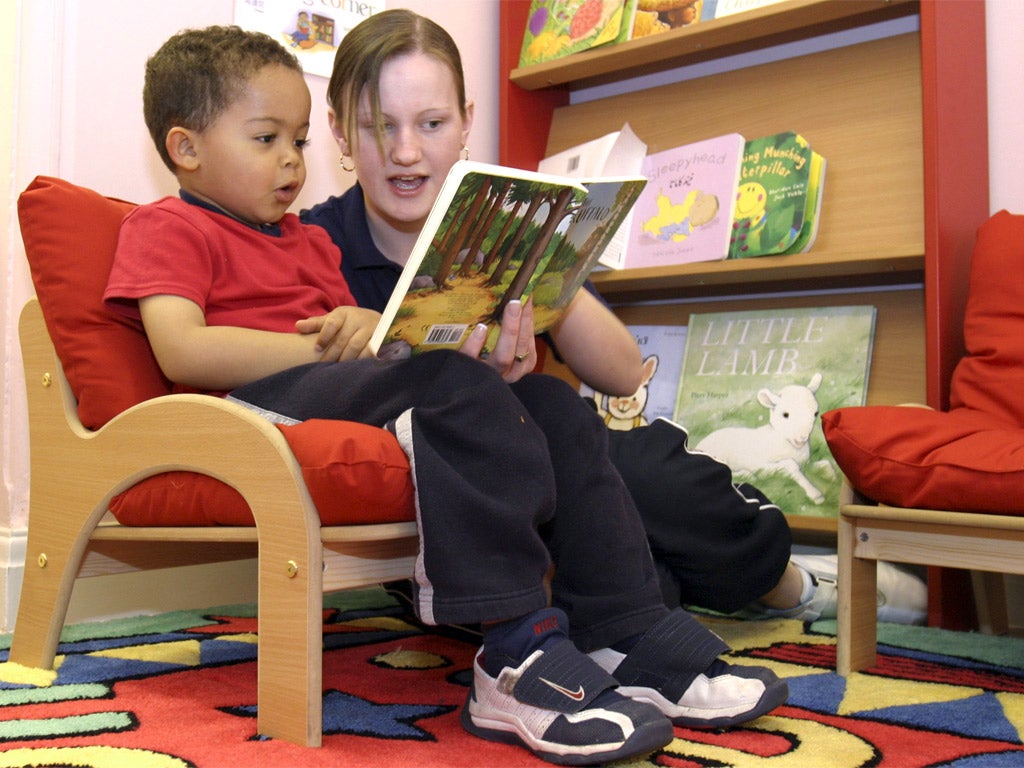Childcare reforms ‘will help richest families’, warn Government advisers
Campaigners say Coalition must tackle ‘in-work poverty’

Ministers have been urged to rethink their plans to help families with the soaring cost of childcare because they will benefit couples with a joint annual income of up to £300,000 while reducing support for poorer people.
The Government’s advisers on child poverty have warned that proposals to bring in 20 per cent tax relief on childcare, worth up to £1,200 per child per year from 2015, will subsidise the better off and create a two-tier system. They are proposing a lower £120,000 cap on the income of dual-earner families who qualify, with the money saved switched to low income families in work.
The Coalition’s plan will help families with all parents in work, if they each earn less than £150,000 per year and do not already receive support through tax credits or the current employer-supported scheme.
Alan Milburn, chairman of the Commission on Social Mobility and Child Poverty, told The Independent: “It's welcome that the UK is seeing signs of economic recovery but social recovery needs a labour market where work always pays.
“Affordable childcare is key. But the Government’s proposals put taxpayers’ money in the wrong place. Subsidising the childcare of families with earnings of up to £300,000 is the wrong priority when low income families in work have had government support for their childcare costs cut from 80 to 70 per cent. The commission believes a fairer, simpler deal is needed. By making childcare more affordable, work incentives would be strengthened.”
Mr Milburn, the former Labour Cabinet minister, said the proposals his commission has sent to the Government would not cost taxpayers a penny more. He urged George Osborne to use his Budget in March to “put right what he got wrong” by switching resources from better-off families to the less well-off.
With two-thirds of children in poverty in 2011-12 living in working households, Mr Milburn warned that Government will not eradicate poverty unless it gets to grips with “in work poverty.”
His blueprint would reverse the Coalition’s £580m cut in the proportion of childcare costs funded by tax credits for low income families, down from 80 to 70 per cent, costing a two-earner couple up to £1,560 a year. He wants all families receiving universal credit, which will replace tax credits, to have 85 per cent of their childcare costs covered by the state, leaving them £2,350 a year better off.
The former Health Secretary warned that 80 per cent of the benefit from the £750m of “tax free childcare” announced in the Budget last March would go to better-off families. It would provide most help to those in the top half of the income scale who do not qualify for tax credits, which top up the earnings of the low paid.
Mr Milburn warned that low income families with more than two children could be disadvantaged by the Coalition’s plans. This echoes the controversial proposal to limit child benefit to the first two children floated last month by Nadhim Zahawi, a Conservative MP and member of the Downing Street policy board.
The Milburn commission said maximum eligible childcare costs through tax credits will continue to be capped at £300-a-week for those with two or more children, so it will be very difficult for parents with more than two children to make work pay. But under “tax free childcare”, maximum eligible costs will be the equivalent of £115-a-week for every child with no maximum limit.
Mr Milburn also urged a rethink over plans for two levels of support to people on universal credit –with 70 per cent childcare costs met if they earn just below the personal tax allowance and 85 per cent if they earn just above it. He warned that this new “cliff edge” would create a narrow “sweet spot” where work pays, and working a few more hours would mean hitting the weekly cap on childcare support. It would mean that some people lose their gains from taking a job or working longer hours and undermine attempts to simplify the system.
The commission expressed concern that support through tax credits will be the same in cash terms in April 2016 as it was in April 2005, even though childcare costs are expected to rise by 80 per cent over the period. It said this poses real problems for the work incentives of people living in high cost areas such as London. It also warned that the support through universal credit could be funded through future welfare cuts signalled by the Chancellor, which could result in many of the apparent beneficiaries losing out from the total package.
Ministers insist their new plans will help the “squeezed middle” rather than the rich and that they have listened to critics by announcing £200m of extra childcare support for low-income families through universal credit from April 2016. This will fund an increase in the proportion of childcare costs from 70 to 85 per cent where all parents in a household are in work and earn above the personal tax allowance.
The Government will finalise its proposals early in the new year after a consultation exercise.
Join our commenting forum
Join thought-provoking conversations, follow other Independent readers and see their replies
Comments